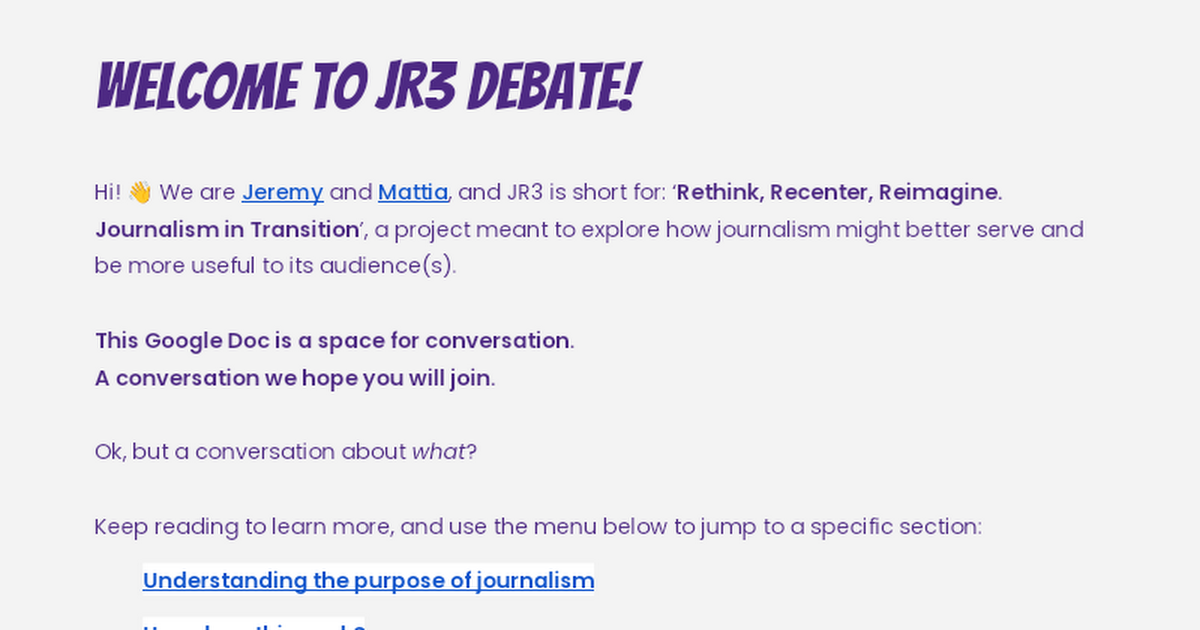🔶 #33: Can one collaborative document turn into a space to debate the purpose of journalism?

Hello and welcome back to the News Alchemists newsletter!
It's been six months (plus one day) since I sent the first edition.
I just needed to write that down because it feels crazy to see what we've built together over the last 182 days. Whether you've been on this journey from that first day back in February or you're receiving this newsletter for the first time: Thank you.
Today is not only an arbitrary anniversary I decided to celebrate, though. This is a special edition because I get to tell you about an experiment I've been working on that I hope you will want to take part in.
You might remember that, four weeks ago, I shared an article I co-wrote with my friend Jeremy Gilbert about JR3, a project we've been working on to explore how journalism might better serve and be more useful to its audience(s).
It looked like an article, but it really was a conversation starter: through two forms embedded in the article, we collected dozens of answers to two questions:
- What is the purpose of journalism?
- What should journalism enable us to feel, think, or do?
Well, if something is a conversation starter, it means that more conversation should follow, right?
That’s what we're doing today by introducing JR3 Debate, which is... a Google Doc. Quite anticlimactic, I know. But it's a Google Doc with big ambitions:
Can one collaborative document turn into the biggest space on the globe to debate what the purpose of journalism really is?
We want to find out – and we hope you’ll help us discover that the answer is YES!

Open JR3 Debate to explore:
🗂️ The main themes that emerged from the answers about the purpose of journalism that came through the forms;
(Spoiler: the most common answer to the first question is that the purpose of journalism is to inform the public; to the second question? Journalism should enable us to take action, to participate in our community, and to connect with one another. Interesting, no?)
💭 Observations and questions that we are pondering on as a result of this process – e.g. "How do we balance the watchdog role of journalism with the need to help people participate in their community and connect with one another?";
💬 Some interesting conversations that developed on LinkedIn – and that you might want to join;
📚 And all the answers we received through the forms – unstructured, as they came in.
In the same way as the article we wrote was designed to be a conversation starter, you can think of JR3 Debate as a discussion forum. A discussion that cannot wait to include your thoughts, questions, and opinions:
And now: seven links 📚
1. We experimented with ways to engage with “news avoiders.” Here’s what we learned. 👉 LINK
🧩 The Texas Tribune wanted to learn more about 1) how to reach younger Texans through short-form video; 2) how to build trust with folks who distrust the news; and 3) how to revamp the organisation's in-person engagement. The findings of their experiments are especially interesting on the second point:
"We created a texting group with Texans who weren't Tribune readers and were lower-than-average news consumers [and] who didn’t generally trust the news. [...] With this texting group active in the run-up to the 2024 general election, we anticipated questions about election processes, but discovered something different."
Participants asked basic civic questions like "Why are there so many judges on the ballot, and what do they all do?". The Tribune team answered participants' questions as quickly as possible, which participants (obviously) appreciated, leading to increased trust and engagement.
I know this is not rocket science, but that's the point: if it's so obvious that helping people builds trust, why aren't more media organisations spending less time churning out content and more time helping people? 🤷♂️
2. Venezuelans turn city buses into newsrooms in order to fight disinformation 👉 LINK
In many countries around the world, most traditional media outlets are owned or influenced by the state, with obvious consequences on (mis)information. Back in 2017, a group of journalists in Venezuela found a creative solution: they moved the evening news from the television to the city bus. Meet 🧩 El Bus TV:
(H/T to 🧞Florantonia Singer who reminded me of El Bus TV in a conversation on the purpose of journalism prompted by JR3.)
3. How the Kyiv Independent reached 20,000 paying members — with no paywall 👉 LINK
For a project idea I've been toying with for a while (more on that soon, hopefully), I was surveying which organisations – among those I most admire – I had not yet featured in the newsletter. I was surprised to realise that I have only mentioned 🧩 The Kyiv Independent once, in the very first edition I sent via email six months ago.
Time to fix that oversight because the Kyiv Independent is awesome, and we have a lot to learn from them – starting from the ingredients that make their membership model so successful. Personal favourite:
“We give them a lot of human connection,” Kyiv Independent COO 🧞Zakhar Protsiuk said. “Everyone who becomes a member, if they reach out to us in any form, anywhere, we have a one-on-one communication with them [...] We answer every single letter we receive.” But Protsiuk sees horizontal connections — between members, rather than from newsroom to audience — as possibly more important to the model’s success. The Kyiv Independent connects readers to each other through monthly events, its Discord, community maps, Ukrainian lessons with a language tutor, and localized campaigns.
✊🇺🇦
4. Editors and reporters often view audience engagement and constructive storytelling with suspicion 👉 LINK
A news organisation is updating its strategy and wants to develop a stronger relationship with its audience. Great! But, as it often happens, editorial people are concerned and push back: they think that involving the audience risks compromising their journalistic independence. How would you suggest the strategy team to approach this challenge?
🧞Francesca Dumas posed this question on LinkedIn and asked for advice. The answers in the comments are gold.
5. Handbook: Charity registration for newsrooms 👉 LINK
The Charitable Journalism Project (CJP) is an important initiative in the UK that helps local non-profit news organisations register as charities – so they can benefit from a range of tax breaks and gain greater access to funding opportunities.
In 2024, CJP was successful in helping the first UK local newspaper become a charity. Now they are sharing this handbook to help more organisations navigate the (long and expensive process) successfully.
6. What we learned by asking the right question 👉 LINK
I love simple solutions that produce small but meaningful improvements, and this one from the 🧩 Financial Times is a good example:
- FT readers often say they value the comments section.
- Posting a comment has the single biggest impact on habit strength...
- ...but it is also one of the rarest behaviours on the site.
- How do we make this part of the experience more visible and inviting?
- About two-thirds of the way through an article, we add a short question to encourage readers to pause, think a little more deeply about what they are reading, and join the conversation in the comments.
Results?
- Comment views rose by 3.5 percent.
- 11.5 percent of readers who hadn’t viewed any comments in the previous month did so.
- And most important: "The tone of the comments has improved. By nudging readers to focus on a specific topic, it’s helped keep conversations on track and reduced off-topic or unproductive rants."
What's not to like?
7. Will AI usher in the end of deep thinking? 👉 LINK
I am not even going to pretend that this episode of the Plain English podcast has anything to do with reimagining journalism. I just found it so fascinating that I really wanted to share it, and hopefully discuss it, with you.
The title is a bit ominous, but the conversation between Derek Thompson (the host of the show) and Cal Newport (whom, by coincidence, I quoted in this newsletter three weeks ago about another podcast) is actually quite deep and balanced.
The main question is one that endlessly fascinates me about the use of AI: Are we slowly unlearning to do certain things, or getting progressively worse at doing them, as a result of making other things easier on ourselves thanks to the support of ChatGPT & Co.? Should we be worried about losing such abilities? Are we thinking deeply enough about the trade-offs we're unwillingly accepting?
📸 The header image is not connected to the content of the newsletter. Just a photo taken by me to add a little colour.



Member discussion